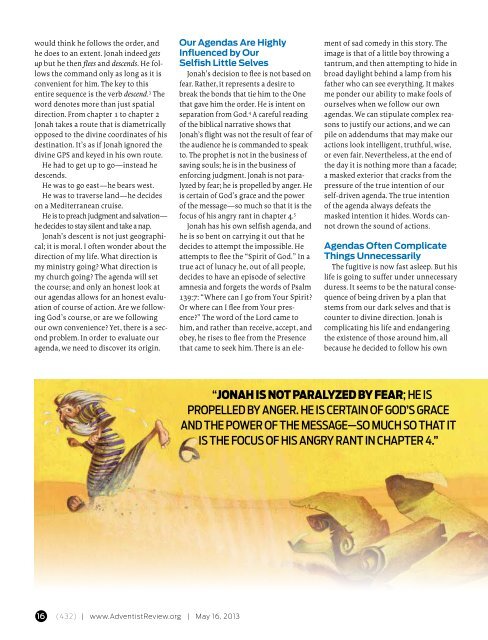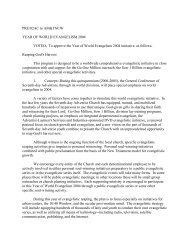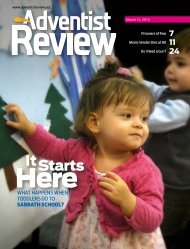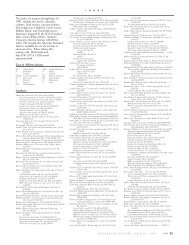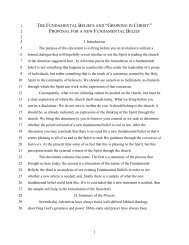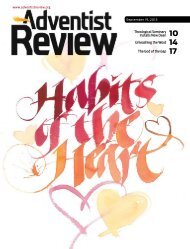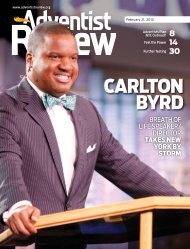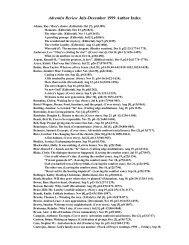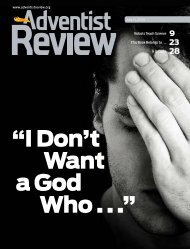Christ Kona?
Download PDF - Adventist Review
Download PDF - Adventist Review
- No tags were found...
You also want an ePaper? Increase the reach of your titles
YUMPU automatically turns print PDFs into web optimized ePapers that Google loves.
would think he follows the order, and<br />
he does to an extent. Jonah indeed gets<br />
up but he then flees and descends. He follows<br />
the command only as long as it is<br />
convenient for him. The key to this<br />
entire sequence is the verb descend. 3 The<br />
word denotes more than just spatial<br />
direction. From chapter 1 to chapter 2<br />
Jonah takes a route that is diametrically<br />
opposed to the divine coordinates of his<br />
destination. It’s as if Jonah ignored the<br />
divine GPS and keyed in his own route.<br />
He had to get up to go—instead he<br />
descends.<br />
He was to go east—he bears west.<br />
He was to traverse land—he decides<br />
on a Mediterranean cruise.<br />
He is to preach judgment and salvation—<br />
he decides to stay silent and take a nap.<br />
Jonah’s descent is not just geographical;<br />
it is moral. I often wonder about the<br />
direction of my life. What direction is<br />
my ministry going? What direction is<br />
my church going? The agenda will set<br />
the course; and only an honest look at<br />
our agendas allows for an honest evaluation<br />
of course of action. Are we following<br />
God’s course, or are we following<br />
our own convenience? Yet, there is a second<br />
problem. In order to evaluate our<br />
agenda, we need to discover its origin.<br />
Our Agendas Are Highly<br />
Influenced by Our<br />
Selfish Little Selves<br />
Jonah’s decision to flee is not based on<br />
fear. Rather, it represents a desire to<br />
break the bonds that tie him to the One<br />
that gave him the order. He is intent on<br />
separation from God. 4 A careful reading<br />
of the biblical narrative shows that<br />
Jonah’s flight was not the result of fear of<br />
the audience he is commanded to speak<br />
to. The prophet is not in the business of<br />
saving souls; he is in the business of<br />
enforcing judgment. Jonah is not paralyzed<br />
by fear; he is propelled by anger. He<br />
is certain of God’s grace and the power<br />
of the message—so much so that it is the<br />
focus of his angry rant in chapter 4. 5<br />
Jonah has his own selfish agenda, and<br />
he is so bent on carrying it out that he<br />
decides to attempt the impossible. He<br />
attempts to flee the “Spirit of God.” In a<br />
true act of lunacy he, out of all people,<br />
decides to have an episode of selective<br />
amnesia and forgets the words of Psalm<br />
139:7: “Where can I go from Your Spirit?<br />
Or where can I flee from Your presence?”<br />
The word of the Lord came to<br />
him, and rather than receive, accept, and<br />
obey, he rises to flee from the Presence<br />
that came to seek him. There is an element<br />
of sad comedy in this story. The<br />
image is that of a little boy throwing a<br />
tantrum, and then attempting to hide in<br />
broad daylight behind a lamp from his<br />
father who can see everything. It makes<br />
me ponder our ability to make fools of<br />
ourselves when we follow our own<br />
agendas. We can stipulate complex reasons<br />
to justify our actions, and we can<br />
pile on addendums that may make our<br />
actions look intelligent, truthful, wise,<br />
or even fair. Nevertheless, at the end of<br />
the day it is nothing more than a facade;<br />
a masked exterior that cracks from the<br />
pressure of the true intention of our<br />
self-driven agenda. The true intention<br />
of the agenda always defeats the<br />
masked intention it hides. Words cannot<br />
drown the sound of actions.<br />
Agendas Often Complicate<br />
Things Unnecessarily<br />
The fugitive is now fast asleep. But his<br />
life is going to suffer under unnecessary<br />
duress. It seems to be the natural consequence<br />
of being driven by a plan that<br />
stems from our dark selves and that is<br />
counter to divine direction. Jonah is<br />
complicating his life and endangering<br />
the existence of those around him, all<br />
because he decided to follow his own<br />
“JONAH IS NOT PARALYZED BY FEAR; HE IS<br />
PROPELLED BY ANGER. HE IS CERTAIN OF GOD’S GRACE<br />
AND THE POWER OF THE MESSAGE—SO MUCH SO THAT IT<br />
IS THE FOCUS OF HIS ANGRY RANT IN CHAPTER 4.”<br />
16 (432) | www.AdventistReview.org | May 16, 2013


